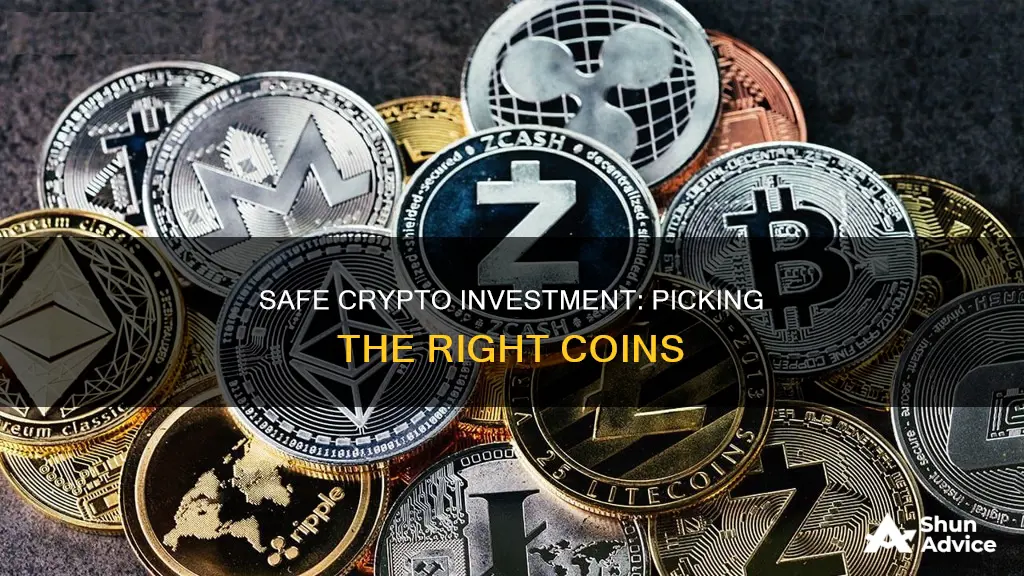
Investing in cryptocurrency is risky due to the potential for high losses from security breaches, fraud, and market volatility. However, it can also deliver tremendous profits, and the growing adoption of crypto by companies suggests that the industry is maturing and investments are becoming safer.
Cryptocurrencies like Bitcoin and Ethereum are considered safer investments because they are more established and mainstream. They are also based on blockchain technology, which offers some inherent security features.
To invest safely in cryptocurrency, it is recommended to use a secure online exchange that follows Know Your Customer (KYC) and Anti Money Laundering (AML) guidelines, such as Coinbase. It is also generally safer to store cryptocurrency in a hardware cold wallet, which is less vulnerable to theft from hackers.
Additionally, investors should be cautious of scams, conduct thorough research before investing, and only invest what they can afford to lose.
| Characteristics | Values |
|---|---|
| Market Capitalization | $1.1 trillion |
| Year-over-year return | 122% |
| Security | Based on blockchain technology |
| Risk | Very Risky |
| Regulation | Unregulated or subject to shifting regulations |
| Investment | Not more than you can afford to lose |
| Safety | Bitcoin and Ethereum are safer bets |
What You'll Learn

Crypto scams and fraud
The world of cryptocurrency is a volatile one, and with its recent surge in popularity, it has become a hotbed for scams and fraud. Here are some common types of crypto scams and ways to protect yourself:
- Investment scams: These scams often promise "make lots of money" with "zero risk" and are usually found on social media or online dating apps. They may involve a fake "investment manager" contacting you out of the blue and promising high returns if you transfer cryptocurrency into their online account.
- Imposter and giveaway scams: Scammers pose as celebrities, businesspeople, or crypto influencers and promise to match or multiply any cryptocurrency sent to them. They create a sense of urgency and legitimacy to trick people into transferring funds quickly.
- Phishing scams: Crypto wallet private keys are targeted through emails that lure recipients to fake websites, where they are asked to enter their private key information. Once the scammers have this information, they steal the cryptocurrency from the wallets.
- Blackmail and extortion: Scammers send emails threatening to expose compromising information about the recipient unless they share their private keys or send cryptocurrency.
- Fake cryptocurrency trading platforms: Fraudulent websites that mimic legitimate crypto trading platforms are used to trick users into entering their wallet passwords and financial information, which falls into the hands of scammers.
- Pump and dump schemes: Fraudsters hype up a particular coin or token through social media, causing a rush of traders to buy and drive up the price. The scammers then sell their holdings, causing the asset's value to sharply decline.
- Fake celebrity endorsements: Scammers pose as or claim endorsements from celebrities to capture attention. This often involves selling phantom cryptocurrencies that don't exist to novice investors, using sophisticated brochures and websites that appear legitimate.
To protect yourself from crypto scams:
- Do your research: Before investing, research the cryptocurrency, its white paper, the team behind it, and look for genuine reviews and testimonials.
- Ignore cold calls: Be wary of anyone contacting you out of the blue to sell a crypto investment opportunity. Never disclose personal information or transfer money to these individuals.
- Protect your wallet: Keep your wallet keys private and be cautious of any firm asking you to share your keys to participate in an investment opportunity.
- Take your time: Scammers often use high-pressure tactics to get you to invest quickly. Take your time, carry out your research, and don't fall for bonuses or discounts offered for immediate participation.
- Be cautious of social media adverts: Maintain a healthy skepticism towards crypto opportunities promoted on social media, especially those using unauthorized images of celebrities or high-profile businesspeople.
- Only download apps from official platforms: While fake apps can end up in the Google Play Store or Apple App Store, it's safer to download from these platforms than elsewhere.
Avalanche Coin: A Smart Investment Decision?
You may want to see also

Crypto volatility
Crypto is widely considered to be a volatile asset class. Crypto markets are highly volatile, with significant price swings that would be considered major events in traditional financial markets. Crypto market volatility is in a league of its own when compared to traditional asset classes like stocks and bonds. For instance, Bitcoin (BTC) has witnessed over eight 50% corrections in its 15 years of existence. However, it has also managed to recover from each correction and reach new all-time highs.
There are several factors that affect crypto volatility:
- Market Maturity: Crypto is still a relatively new asset class, and the market is going through a high growth phase. As a result, prices fluctuate as new participants enter the market and try to establish a consensus on the fair value of digital assets.
- Supply and Demand Dynamics: The limited supply of certain crypto assets, such as Bitcoin, with its supply cap of 21 million coins, can lead to increased volatility. Sudden increases in demand can put upward pressure on prices, and large holders (known as "whales") can significantly impact prices by buying or selling large quantities.
- Investor Sentiment: The crypto market is heavily influenced by investor sentiment, and positive or negative views can spread like a contagion. For example, when Tesla bought Bitcoin in January 2021, the markets reacted with exuberance, driving up the price.
- Regulation: The lack of comprehensive and clear regulation in the crypto market also contributes to volatility. The unique characteristics of cryptocurrencies present challenges for regulators, and the absence of regulatory guardrails allows for higher volatility.
- Market Structure: The crypto market is fractured across many different exchanges and trading venues, making it difficult for large players to enter or exit the market without affecting prices. This lack of liquidity and depth in the market contributes to volatility.
- News and Speculation: Speculation and news events, such as COVID-19, drive price swings in crypto markets, and the effects of these events are often exaggerated due to the market's immature nature.
While crypto volatility presents risks for investors, it also creates opportunities for high returns. For some investors, the potential for significant upward and downward movements is part of the appeal of crypto. Additionally, as the crypto market matures and becomes more widely accepted, we can expect to see a reduction in volatility over time.
Math Coin: A Good Investment Option?
You may want to see also

Crypto security
With the growing popularity of cryptocurrencies, the security of crypto transactions has become a major concern. Cryptocurrency security refers to the measures taken to secure crypto transactions from fraudulent activities and maintain the security of digital currencies. It is important to understand the key elements that make up a secure crypto environment to ensure the safety of your digital assets.
Cryptocurrency Security Measures
- Wallets: Crypto wallets are crucial for digital currency security. Hardware-based wallets are generally considered more secure than software-based ones. Keeping your wallet's private keys safe is essential.
- Secure Internet Connection: Always use a secure internet connection when dealing with cryptocurrencies. Avoid public Wi-Fi networks as they can be hotspots for cyber threats.
- Exchanges: Not all cryptocurrency exchanges are equally secure. Research an exchange's security measures before committing. Look for features like two-factor authentication (2FA), cold storage, and withdrawal whitelists.
- Education: Stay updated with the latest security trends and threats in the crypto space. Understanding the technology and potential threats is crucial for protecting your digital assets.
- Secure Wallets: Opt for wallets known for strong security features. Hardware wallets that store your private keys offline offer higher security than online wallets.
- Two-Factor Authentication (2FA): 2FA adds an extra layer of security to your accounts. Even if your password is compromised, a secondary code sent to a trusted device is required to access your account.
- Regular Software Updates: Ensure your devices, wallets, and apps are up-to-date. Updates often include security enhancements that protect against newly discovered threats.
- Secure Networks: Avoid conducting crypto transactions over public Wi-Fi networks. Use secure networks to protect sensitive data and make it more difficult for hackers to intercept.
- Phishing Awareness: Be vigilant about potential phishing attempts. Always double-check emails and messages, especially those asking for sensitive information.
- Strong Passwords: Use strong, complex passwords for your crypto accounts. Avoid simple or short passwords, and consider using special characters to make them harder to crack.
Common Cryptocurrency Security Threats
Some common security threats in the crypto space include:
- Phishing Attacks: Attackers pose as trustworthy entities to trick victims into revealing sensitive information. Phishing can occur via email, text messages, or fake websites.
- Exchange Hacks: Cryptocurrency exchanges are lucrative targets for hackers despite improved security measures. Hackers exploit vulnerabilities to steal funds from exchange users.
- Email Attacks: Email attacks are prevalent and successful. Adversaries use large-scale phishing campaigns to infiltrate organizations, sending malicious files or directing recipients to harmful websites.
- Wallet Hacks: Crypto wallets, especially those connected to the internet (hot wallets), are vulnerable to attacks. If an attacker gains access to your wallet's private keys, they can steal your funds.
- Ponzi and Pyramid Schemes: These fraud schemes promise high returns to investors but rely on new participants' funds to pay profits to earlier investors. Eventually, when new investors dry up, the scheme collapses.
Most Secure Cryptocurrency
Ethereum is considered the most secure cryptocurrency compared to other digital assets. Its platform utilizes blockchain technology, one of the most robust technologies for digital transactions. Additionally, Ethereum uses the proof-of-stake consensus method, deterring bad actors by making it difficult to exploit or control the network.
The Cryptocurrency Security Standards (CCSS) provide a framework of security protocols designed by the Cryptocurrency Certification Consortium (C4). These standards offer guidelines for organizations handling cryptocurrencies, ensuring the safe management and security of digital assets. CCSS covers various aspects, including key generation, storage, and transaction operations, providing protection against potential cyber and physical threats.
STX Coin: A Good Investment Option?
You may want to see also

Crypto regulation
The world of cryptocurrency is an ever-evolving one, with new developments and innovations emerging at a rapid pace. However, when it comes to regulation, the crypto industry is still in its infancy, with varying degrees of regulatory frameworks across different countries and states.
In the United States, for example, there is currently no federal regulatory framework for digital assets. Each state has its own approach to regulating cryptocurrency and blockchain technology, resulting in a lack of uniformity across the nation. Some states, like New York, have implemented strict regulations like the BitLicense, while others, like Wyoming, have created crypto-friendly environments with minimal regulations.
The lack of clear and consistent regulation has led to concerns about investor protection, as the volatile nature of the crypto market poses significant risks. This is where regulatory bodies step in, aiming to protect consumers and provide a level playing field for all participants.
One of the key challenges in crypto regulation is the decentralized nature of the industry. Cryptocurrencies are designed to operate without central authorities, making it difficult for governments and financial institutions to exert control. However, as the industry matures and gains wider adoption, regulatory frameworks are becoming increasingly important to provide much-needed stability and security.
Another aspect of crypto regulation is the tax implications. In many countries, including the United States, cryptocurrency is treated as property for tax purposes. This means that any gains or losses from crypto investments are subject to capital gains taxes. Additionally, income earned from crypto mining or staking is also taxable.
The regulatory landscape for cryptocurrency is constantly evolving, and it varies greatly across different jurisdictions. While some countries are embracing the technology and adopting crypto-friendly policies, others are taking a more cautious approach or even banning crypto activities altogether.
As the industry continues to grow and evolve, it is likely that regulatory frameworks will become more standardized and comprehensive. This will help address the concerns around consumer protection, tax evasion, and illegal activities associated with the crypto space.
In conclusion, while the decentralized nature of cryptocurrency poses challenges for regulation, it is crucial to strike a balance between fostering innovation and ensuring investor protection. Clear and consistent regulatory frameworks will play a vital role in shaping the future of the crypto industry, making it safer and more accessible to a wider range of participants.
Rat Coin: A Guide to Investing in the Volatile Market
You may want to see also

Crypto as a long-term investment
Cryptocurrency is a decentralised and secure digital currency based on blockchain technology. It is not always a safe investment, but it is here to stay. Crypto is a risky but potentially lucrative investment option.
Risks of Investing in Crypto
Crypto exchanges are vulnerable to hacking and other criminal activity. Investors have lost large sums of money due to security breaches. There is also a risk of losing your private key if you opt for offline cold storage.
The crypto market is highly volatile, and investors could lose a significant portion of their original investment. Crypto is also susceptible to scams and fraud.
Benefits of Investing in Crypto
Crypto has delivered tremendous profits for some investors. It offers new investment opportunities and the potential for high returns.
Tips for Long-Term Crypto Investment
- Only invest what you can afford to lose.
- Use dollar-cost averaging: make small, recurring purchases on a set schedule.
- Research and understand the fundamentals of the crypto project, such as its utility, transaction speed, security, and competitive advantages.
- Stick to major cryptocurrencies like Bitcoin and Ethereum, which have larger market capitalisations and are more established.
- Understand the technology powering crypto, such as blockchain networks and consensus mechanisms.
- Be aware of regulations and their potential impact on crypto prices and adoption.
- Use crypto indicators like moving averages and relative strength to inform your investment decisions.
- Choose a trusted cryptocurrency exchange.
- Be cautious of scams and only invest in projects with experienced teams.
Bitcoin as a Long-Term Investment
Bitcoin is the most widely known and trusted cryptocurrency. It has a fixed supply of 21 million coins, giving it value through scarcity. Many investors view it as a hedge against inflation and as "digital gold".
Ethereum as a Long-Term Investment
Ethereum is the second-largest cryptocurrency and is favoured by program developers. It supports decentralised applications and non-fungible tokens (NFTs). Its native coin, Ether, has the potential to increase in value as the Ethereum platform gains wider adoption.
Other Long-Term Crypto Options
Other cryptocurrencies with long-term potential include Chainlink, Polkadot, Cardano, Avalanche, and Aave. These projects offer unique use cases, fast transaction speeds, and high staking rewards.
Crypto is a risky investment due to its volatility and the potential for significant losses. However, it can be a good long-term investment option if you conduct thorough research, understand the technology, and carefully choose established cryptocurrencies with strong fundamentals.
Bitcoin Investment: Is It Too Late to Invest?
You may want to see also
Frequently asked questions
There are several risks associated with investing in cryptocurrency, including loss of capital due to its extreme volatility, government regulations, fraud, and hacks.
There are some security risks to be aware of when investing in cryptocurrency. Paying with crypto comes with limited legal protections, and it is generally not possible to recover your money if you lose it to a scammer. Additionally, cryptocurrency transactions are generally not editable or reversible, so there is no way to get a refund if things go wrong.
The safest online platforms for buying cryptocurrency tend to be those that ask you to prove your identity and follow Know Your Customer (KYC) and Anti Money Laundering (AML) guidelines. To store cryptocurrency, it is generally recommended to use a hardware "cold" wallet, which keeps your crypto offline and away from potential online hackers.
Bitcoin and Ethereum are the two largest and most established cryptocurrencies, making them a safer bet for most investors. They also have some inherent security features thanks to their use of decentralized blockchain technology.







